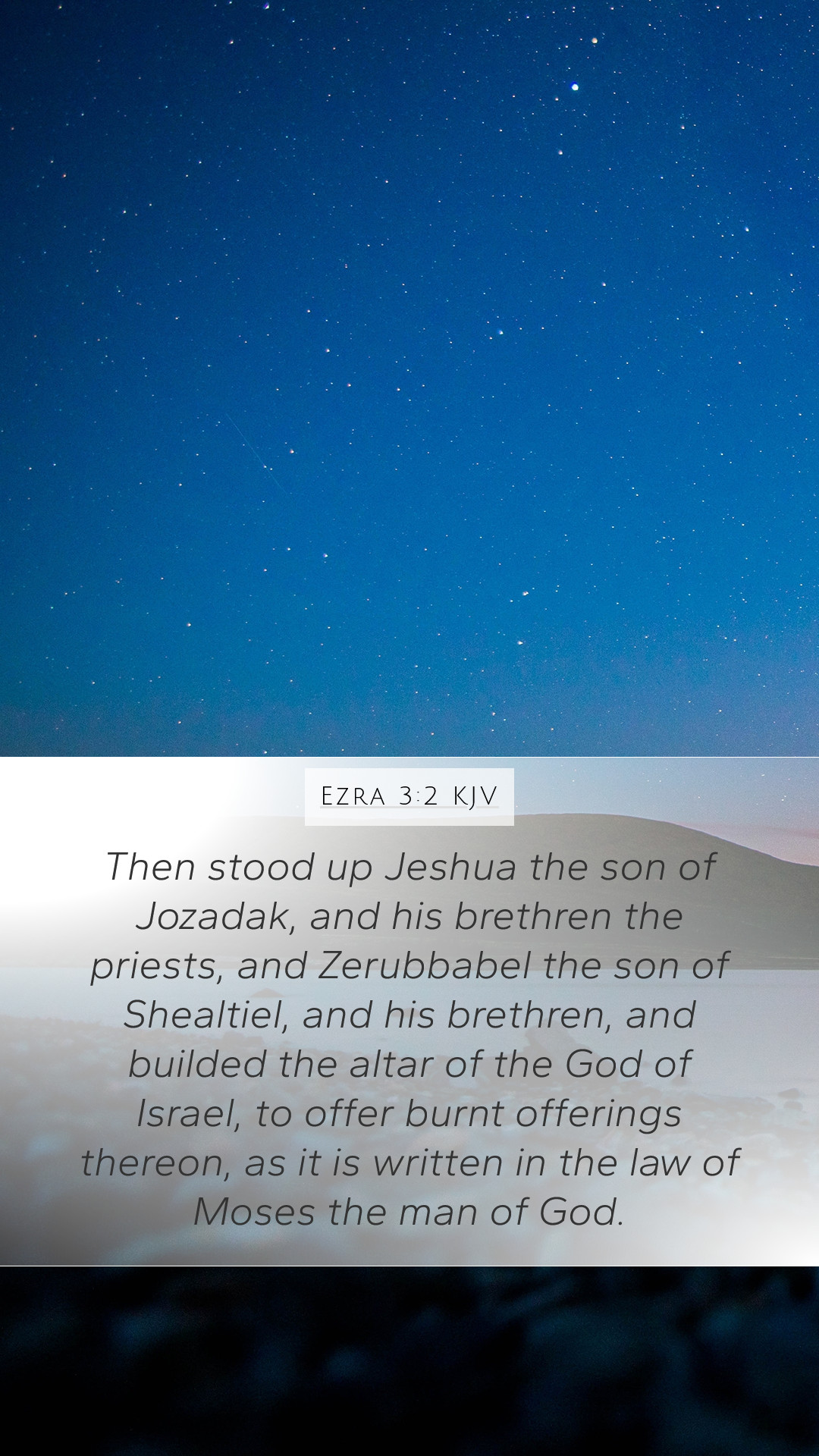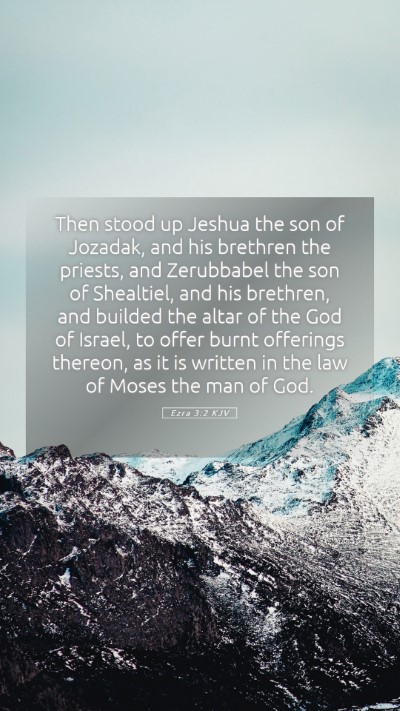Old Testament
Genesis Exodus Leviticus Numbers Deuteronomy Joshua Judges Ruth 1 Samuel 2 Samuel 1 Kings 2 Kings 1 Chronicles 2 Chronicles Ezra Nehemiah Esther Job Psalms Proverbs Ecclesiastes Song of Solomon Isaiah Jeremiah Lamentations Ezekiel Daniel Hosea Joel Amos Obadiah Jonah Micah Nahum Habakkuk Zephaniah Haggai Zechariah MalachiEzra 3:2 Meaning
What is the meaning of Ezra 3:2?
Then stood up Jeshua the son of Jozadak, and his brethren the priests, and Zerubbabel the son of Shealtiel, and his brethren, and builded the altar of the God of Israel, to offer burnt offerings thereon, as it is written in the law of Moses the man of God.
Ezra 3:2 Bible Verse Meaning
Bible Verse Meaning of Ezra 3:2
Ezra 3:2 states, "Then stood up Jeshua the son of Josedech, and his brethren the priests, and Zerubbabel the son of Shealtiel, and his brethren, and built the altar of the God of Israel, to offer burnt offerings thereon, as it is written in the law of Moses the man of God."
This verse is crucial in understanding the restoration efforts of the Jewish people after their return from Babylonian exile. Below is a combination of insights from various public domain commentaries:
Contextual Background
The book of Ezra focuses on the return of the exiles to Jerusalem and the rebuilding of the temple. This particular verse introduces key figures: Jeshua, who represents the priestly line, and Zerubbabel, who is linked to the royal lineage. Their actions signal a revival of religious practices that had been neglected during the exile.
Commentary Insights
-
Matthew Henry:
Henry emphasizes the significance of Jeshua and Zerubbabel as symbols of leadership and restoration. He notes that their endeavor to build the altar represents a recommitment to worship and obedience under the Law of Moses. This illustrates a vital step in the re-establishment of the community’s identity and relationship with God.
-
Albert Barnes:
Barnes highlights the urgency of their actions. The construction of the altar showcases the priority of worship even before the actual temple building begins. He discusses how the burnt offerings are a restoration of atonement practices, underlying the necessity of sacrifice in the religious life of Israel.
-
Adam Clarke:
Clarke reflects on the historical context, explaining how the altar was central to the religious life of Israel. Clarke points out that their actions indicate a return to faithfulness and reverence in accordance with the Mosaic Law, which is vital for their spiritual revival.
Spiritual and Theological Significance
Ezra 3:2 encapsulates themes of renewal, worship, and the importance of leadership in restoring faith. It illustrates how the Jewish people sought to reconnect with their heritage and divine mandate after years of hardships. The building of the altar symbolizes not only physical restoration but also spiritual recommitment to God.
Applications for Today
This verse encourages modern believers to prioritize worship and obedience to God. Just as the Jewish community sought to restore their relationship with God through tangible actions, individuals are called to do likewise in their personal lives and communities.
Bible Study Insights
For those engaged in Bible study groups or online Bible study, Ezra 3:2 serves as an excellent discussion point. It invites explorations into:
- The role of leadership in fostering spiritual renewal.
- The significance of communal worship in adhering to God's commands.
- Historical context and motivations behind the Jewish return from exile.
Related Bible Verses
This verse correlates with several other scriptural references, enhancing understanding through context:
- Nehemiah 10:32-33 - Discusses commitments to restoring worship.
- Haggai 2:4-5 - Assures God’s presence during reconstruction.
- Zechariah 3:8 - Highlights the significance of Joshua the high priest.
Conclusion
In summary, Ezra 3:2 reminds readers of the importance of sacrificial worship and the leaders’ role in guiding a community back to God. An understanding of this verse sheds light on broader themes of renewal, obedience, and the foundational role of worship in a believer’s life.
As you explore this scripture, consider how it applies to your own life and worship practices. Engage in Bible study lessons or utilize Bible study resources to delve deeper into the meanings of similar passages.


